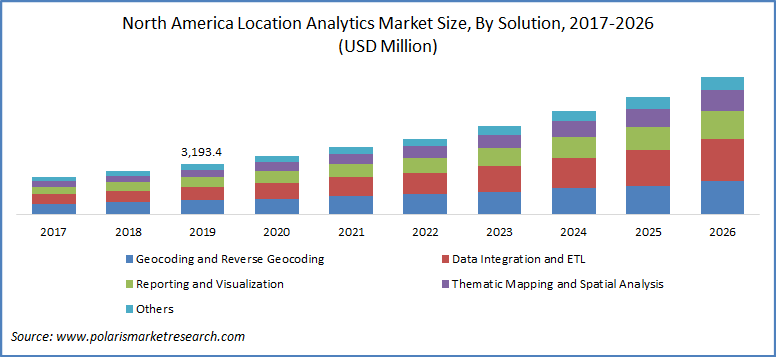New York City, 20 Jul 2020: The global location analytics market size is expected to reach USD 29.87 billion by 2026 according to a new study by Polaris Market Research. In business sector, almost everything exists at a particular location and at a specific time. It could be things such as products, raw materials, facilities, employees, customers, agents, or events. Businesses can make more well-versed decisions by understanding how these components relate to one another through location analytics. This can improve both efficiency and effectiveness of the businesses. Furthermore, location analytics helps in targeting and understanding customers and also helps in optimizing business processes.
The location analytics market is mainly driven by increasing usage and application of spatial data and analytical tools in various industrial sectors. Furthermore, factors such as increasing adoption of location-based applications and tools among users, growing necessity for predictive analytics in several business applications, growing adoption and necessity of innovative technologies, and increasing penetration of social media for customer engagement are also driving the growth of the market across the globe. Moreover, location analytics can considerably help the in making targeted decisions, aid in visualizing business performance, and also help in lowering costs and mitigating risks in supply chain management.
 |
| Request for sample pages |
The key players in the market include SAS Institute, Esri, Oracle, Pitney Bowes, Microsoft, Galigeo, Cisco Systems, IBM, Purple, GeoMoby, Alteryx, Inc., CleverAnalytics, IndoorAtlas, Lepton Software, and Quuppa among others.
However, factors such as concerns with data privacy and legal worries, high initial cost of deployment, and deficiency of uniform regulatory norms, are expected to hinder the growth of market during the forecast period. Furthermore, increasing security concerns, lack of technical expertise and awareness, and poor connectivity and data integration also restraints the market growth.
North America and Europe take hold of more than half of overall market. As the retail industry in these regions is experiencing a significant boom, and penetration of smartphones and other advanced tools is high, there is rapid growth in adoption of analytical business intelligence and geographic information systems technology. Likewise, increasing focus on customer needs and customer satisfaction also plays a major role in development of this market. Furthermore, large number of individual customers or enterprises in Europe extensively use location-based mapping services, which has made this region a R&D hub for the market.
In European countries, location analytics is largely used to conduct marketing campaigns and customer management with an aim of business expansion. Furthermore, growing smartphone industry, and increasing adoption of GPS tracking systems has also enhanced the growth of location analytics in European countries. However, based on growing number of smartphone and social media users, service providers and enhancement of networking technologies, Asia-Pacific is expected to witness a fastest growth in the global market during the forecast period. Huge population base, growing internet penetration has made this region a popular area of expansion for established as well as emerging companies. This is largely contributing to the growth of the market in Asia-Pacific region.